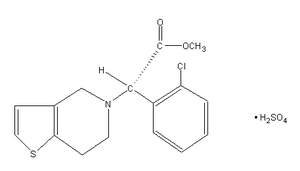Clinical Question: What is the best anti-thrombotic for patients with a history of upper gastrointestinal (GI) bleeding?
Setting: Inpatient (any location) with out-patient follow-up
Study Design: Randomized controlled trial (double-blinded)
Allocation: Concealed
Synopsis: Clopidogrel has been recommended by the American College of Cardiology as the preferred drug for patients who require an antithrombotic agent to prevent heart disease but have a history of bleeding peptic ulcer. This study compared clopidogrel with the combination of aspirin and esomeprazole. Patients with a source of upper GI bleeding (52 percent gastric ulcer, 34 percent duodenal ulcer, 8 percent with both, and 6 percent other erosions) who had healing confirmed by endoscopy were randomized to receive clopidogrel in a dosage of 75 mg daily plus esomeprazole placebo twice daily or aspirin in a dosage of 80 mg daily plus esomeprazole in a dosage of 20 mg twice daily. Groups were fairly well balanced at the outset and analysis was by intention to treat. Patients were treated for 12 months.
The primary outcome (hematemesis, melena, or a decrease in hemoglobin of at least 2 g per dL accompanied by endoscopic evidence of ulcer or erosion) occurred in 8.6 percent of the clopidogrel group and 0.7 percent of the aspirin plus esomeprazole group (P = .001; number needed to treat = 13). Three patients in the clopidogrel group had severe bleeding complications not related to the GI tract, including two intra-ventricular hemorrhages, one of which was fatal; there were no bleeding complications in the aspirin group. More deaths occurred in the clopidogrel group (eight versus four), but this difference was not statistically significant. Also, the groups were similar in the likelihood of adverse cardiovascular events (nine in the clopidogrel group versus 11 in the aspirin group).
Bottom Line: For patients with a history of bleeding peptic ulcer, the combination of aspirin and a proton pump inhibitor (PPI) twice a day was safer than clopidogrel in terms of bleeding side effects. Although esomeprazole was used in this study, generic omeprazole in a dosage of 20 mg twice daily provides nearly the same degree of acid suppression at a much lower cost. This study calls into question the overall safety of clopiogrel, which has been claimed to not significantly increase the risk of bleeding. (Level of Evidence: 1b)
Study Reference: Chan FK, et al. Clopidogrel versus aspirin and esomeprazole to prevent recurrent ulcer bleeding. N Engl J Med January 20, 2005;352:238-44.
Used with permission from Ebell M. Aspirin + PPI safer than clopidogrel if history of GI bleed. Accessed online March 1, 2005, at: http://www.InfoPOEMs.com.
COPYRIGHT 2005 American Academy of Family Physicians
COPYRIGHT 2005 Gale Group



